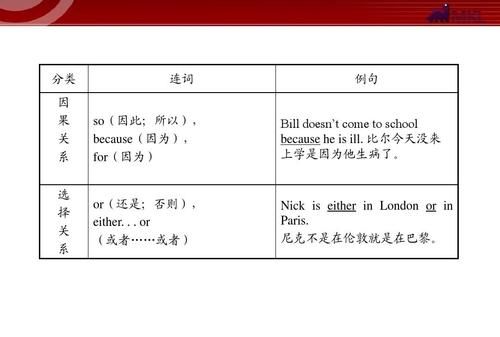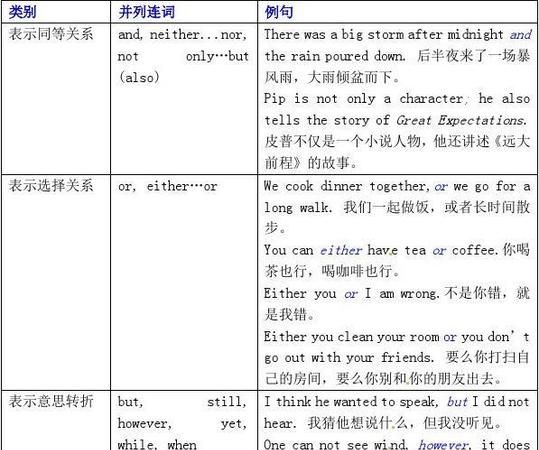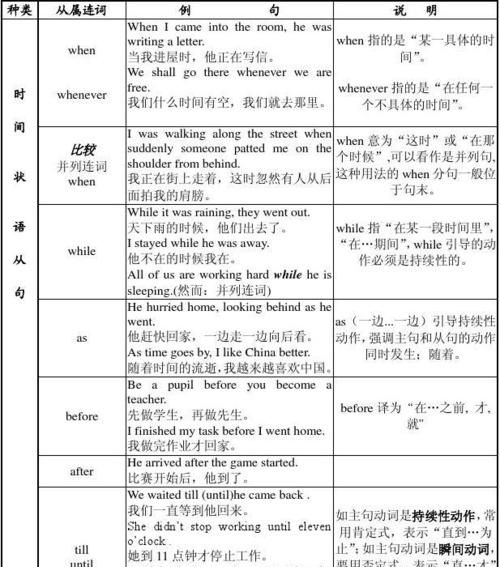本文目录
英语连词用法大全 连词总结
说到连词大家可能最先想到的就是“and”“or”“but”,除了这些还有哪些连词呢,这些连词的结构、用法又是怎样的呢,下面就来详细了解一下初中英语连词的具体用法。
英语连词用法大全,英语常用连词有哪些
连词的定义
连词是连接字、 短语 、从句与 句子 的词,是虚词,因此它不能独立担任句子成分。连词主要分为两大类:并列连词和从属连词。并列连词用来连接并列关系的词、词组或分句。它包括:and,or,but,so,for,both…and,either…or,neither…nor,not only…but also。
从属连词用来引导从句,它包括: that, when, till, until, after, before, since,because,if,whether,though,although,so…that,so that,in order that,as soon as
并列连词用来连接具有并列关系的词,短语或句子。常见的并列连词有:
英语连词用法大全,英语常用连词有哪些
(1)表并列关系的and, both…and, not only…but also, neither…nor等。
(2)表选择关系的or, either…or等。
(3)表转折关系的but, while等。
(4)表因果关系的for, so等。
知识点概述
并列连词和从属连词的用法
连词是连结单词、短语、从句或句子的虚词, 在句子中不单独作句子成份。
连词按其性质可分为:
1.并列连词 如:and, or, but, for, 等, 连接并列的词与词,短语与短语,句子与句子。
如:Rice and potatoes are common foods. (词与词)
Today we can travel by plane. (短语与短语)
Many trees lose their leaves in winter, but evergreen trees do not. ( 句子与句子)
关联连词是一类成对使用的连词
如:both……and……, not……but…….
not only……but also…… not only…but… as well
either……or…… neither……nor……
关联连词必须后接同样的语法结构。
如:Either the windows were opened or the door was opened.
2.从属连词 如:that, whether, when, because, though 等, 用以引导名词性从句和状语从句。
英语连词用法大全,英语常用连词有哪些
3.从属连词引导的从句不可以被断成一个句子。 如果断开,就错了。
如:When the alarm clock rang. (不完整)
4. though (although)引导让步状语从句,because 引导原因状语从句, 所以though(although)不能和并列连词but ,because 不能和并列连词 so一起使用。 只能单独使用。
复习时需要注意的要点
(1)表示选择关系的连词,连接的双方只取其一。常用连词有or, either...or, otherwise
例如:
1)You can go to Beijing either today or tomorrow
2)You must get up early or you won’t catch the early bus.
(2)表示转折关系,连接的双方构成对比,意义上有转折。常用连词有but, however, while, only
例如:
1) His brother is fond of football while he likes basketball.
2) You can watch TV, but you must finish your homework first.
(3)表示联合关系,联合的双方是对等的,意义上趋向一致。常用连词有:and, both...and, neither...nor, not only...but also, as well as, together with
例如:
1) To study English well, we need both diligence and careful.
2) That horse is not only the youngest among the five, but also runs the fastest.
(4)表示因果关系,连接的双方,互为因果,或者前因后果,或者前果后因。常用的连词有:for, so, therefore
例如:
1) It must have rained, for the ground is wet.
2) You are in the right, therefore they should support you.
实战演练
一、例题选讲
例1 he did not know much English,he got out his dictionary and looked up the word.
A. As B. For
C. Since D. Because
答案: A
提示: for,because和as虽皆可作连词用,表示“因为”,但用法有些区别。for引导的分句总是置于另一分句之后,常常对前一分句加以解释,两个分句之间,总是用逗号分开。because引导的原因状语从句时,往往以why问句,语气比较重,传递的往往是对方未了解的新信息。as引导的原因状语从句时,往往是对方也知道的信息。本句是他拿出词典查,显然,“他知道的 英语单词 不多”,这是明摆着的事,所以用as最恰当。
例2 you don't feel well,you'd better stay at home.
A. Because B. Since/If
C. For D. Now
答案: B
例3 I don’t know he has received the package.
A. if B. when
C. what D. how many
答案: A
提示: if表示是否,when不能与现在完成时连用。
例4 Come tomorrow, I will give it to you.
A. or B. and
C. though D. if
答案: B
提示: and在此处解释为“那么”,表示递进关系。
例5 The teacher his students likes football.
A. and B. as well as
C. and also D. also
答案: B
提示: as well as 连接两个主语用靠前原则。
例6 We were having lunch some one knocked at the door.
A. as B. a soon as
C. when D. while
答案: C
填入适当的连词。
1. My brother is ill, ________ I have to stay at home.
2. The film must be very interesting, ________ many people are buying tickets in line.
3. My computer is new, ________ it is too expensive.
4. She felt hungry, ________ she didn’t have breakfast.
5. A customer came in, ________ I stopped my work.
6. He has a lot of money, ________ he spends little.
7. Come here early, ________ you can’t see him.
8. Take some medicine, ________ you will feel better.
9. There are a lot of stories about the UFOs, _______ no one knows whether they are true or not.
10.Put on your coat, ________ you will catch cold.
11.She got a “C” in English test, ________ she had tried his best.
12.My little cousin can _________ read ________ write.
13.Please call me _______ you need my help.
14._____you have a few more days’ rest, you’ll feel better.
15._____ my father ______ my mother is a doctor. They are teachers.
16.I really don’t know ______ it is going to rain or not this afternoon.
17.You may ______do it yourself ________ leave it to me.
18.Hurry up, ______ you’ll miss the next bus.
19.Li Ming was a brave boy, ______ he had one shortcoming.
20.It’s a fine day, ____ we have a wonderful time.
21.I don’t know _______ she can speak Russian or not.
22.We haven’t decided _____ and ______ we shall meet next time.
23.That’s ______ they didn’t pass the exam.
24._______ you are right, _____ he is.
25.He ______ _____ read the book ______ _______ remembered what he read.
参考答案
1.so 2.for 3.besides 4.as 5.so 6.but 7.or 8.and 9.but 10.or
11.though 12.neither, nor 13.if/when 14.if 15.neither, nor 16.whether
17.either, or 18.or 19.though 20. 21.whether 22. 23.why
英语连词用法大全相关 文章 :
1. 英语连词用法归纳总结(2)
2. 英语连词基础语法及用法
3. 英语中常见的连词和用法讲解
4. 中学英语连词的用法
5. 英语语法:连词的用法和从属连词
6. 连词英语语法知识点汇总
7. nevertheless的用法总结大全
8. 中考英语词汇知识点:连词的定义及用法
9. 英语连词学习的注意要点
10. 初中英语语法:连词and和or的用法和区别

高中英语连词知识点归纳
连词是一种虚词,在句中不能单独使用。连词可分为两类:并列连词和从属连词。下面我给大家分享一些高中英语连词知识,希望能够帮助大家,欢迎阅读!
高中英语连词知识1
并列连词的用法
1.并列连词and的用法
and可以连接两个的词,多用于肯定句中。连接两个 句子 ,表示因果、对比、条件、假设、目的等。例如:
Go and fetch something to eat.(连接两个动词如go, come等表示目的)去取些吃的东西来。
Mary likes music and Lily is fond of sports.
玛丽喜欢音乐,莉莉 爱好 体育运动 。(对比)
One more week and we’ll accomplish the task.
再一星期,我们就完成任务。(条件)
2.并列连词both…and, not only…but also, as well as的用法
①both…and意为:“不但…而且…;既…又…”,是并列连词,可以并列主语、宾语、表语、状语、谓语等成份。并列主语时谓语动词用复数形式。
Both New York and London have traffic problems.
纽约和伦敦都存在交通问题。
The secretary both speaks and writes Spanish.
这位秘书不但能讲而且能写西班牙语。
②not only…but also意为:“不但...而且”,是并列连词,可以连接两个词,也可连接两个句子。其中,but also中的also可以省略。not only…but also可以连接句中所有的成份,连接并列主语时,其谓语动词根据就近原则,与所靠近的成分保持数的一致。not only…but also可以连接两个句子,not only位于句首时, not only后的句子要倒装。
Not only the students but (also) their teacher is enjoying the movie.
不仅学生们津津有味地看着这部电影,而且他们的老师也是如此。
Not only is he a scientist, but he is also a fighter.
他不但是位科学家而且还是名战士。
③as well as 其连词作用,表示“同、和、也”等。
The editors as well as the proofreaders are working overtime.
编辑和校对者都在加班工作。
3.when并列连词,意为“就在那时”
I was about to leave when the telephone rang.
我刚想走,突然电话铃响了。
4.表示转折关系的并列连词
这类连词连接两个含义不同的甚至是反义的词、 短语 或分句。常见的还有yet(然而),while(而),however(可是)等。其中while与but的区别在于:while表示对比,而but表示意义正好相反。
Learning the guitar isn't difficult ,but you have to practice.
学弹吉它并不难,但你得练习。
In some Asian countries , nodding the head means not “Yes”but “No”.
有些亚洲国家,点头并不表示“是”而是表示“不”。
He was in deep trouble , yet he didn't lose heart.
他深陷困境,然而他没有丧失信心。
Rick was very successful. However, the last few years of his life were not happy ones.
瑞克非常成功,然而他的晚年并不幸福。
You like sports, while I'd rather read.
你喜欢体育而我却喜欢读书。
5.表示选择关系的并列连词
此类并列连词主要有or, or else, either…or, otherwise,neither…nor, not nor等。
(1)or的用法
可以连接两个的词,多用于否定或者疑问句中。主语的人称、数不一致时, 动词随着接近的主语而变化。连接两个句子,常和else连用。
John or you are in Class Two.约翰或者你在二班。
Put on your overcoat, or you will catch cold.
穿上你的大衣,不然你会着凉。
Hurry up, or/or else we'll be late for the meeting.
赶快,否则我们开会要迟到的。
注意:or, or else, otherwise三者相比,or else语气较or强,而otherwise语气则最强。
(2)either…or, neither…nor, not …nor的用法
可以连接两个的词,也连接两个句子,当neither, nor放句首时,该句倒装。
either…or, neither…nor, not …nor等连接主语时,谓语动词也依据就近原则。
Either my father or my brothers are coming.
不是我父亲就是我兄弟要来。
Neither could theory do without practice, nor could practice do without theory.
理论没有实践不行, 实践没有理论也不行。
6.表示因果关系的并列连词
这类连词常见的有so(因此),for(因为),therefore(因此)等。并列连词for表示原因,用以附加说明。这个词引导的分句必须放在第一个分句之后。
for可以表示原因,但引起的不是从句,而是分句,对前面的情况加以解释,有逗号把它和前面的分句分开,在书面语中用的较多。so 表示结果,意为“因此,所以,于是”。therefore意为“因此, 所以”,语气比较文气,多放在分句或句子的前面。
I apologized to her , for I had wronged her.
我向她道歉了,因为我错怪了她。
He was sick, so they were quiet.
他病了, 所以他们 很安静。
He broke the law ,therefore he was put into prison.
他违犯了法律,因此被投入监狱。
高中英语连词知识2
从属连词的用法
用来连接主句和从句的连词叫从属连词。从属连词分为两大类,即引导状语从句的从属连词和引导名词性从句的从属连词。
(一) 引导状语从句的从属连词
1、引导时间状语从句的从属连词
此类连词主要有:when, while, after, before, as, as soon as , now(that), until, till, once, since, whenever, no sooner...than, hardly/barely/scarcely...when,every time, each time, next time, the last time, the moment等。
When I got to the theatre, I found that they had sold all the tickets.当到达剧院时,我发现票已售完。
We should strike while the iron is hot.
我们要趁热打铁。
Since he entered the university, he has made great progress in his studies.
进入大学以来,他在学业上已经取得了很大进步。
They kept on working until it became dark.
他们一直工作到天黑。
Once you begin , you must go on.
你一旦开始,就必须继续下去。
You seem to have a ready-made answer, whenever I ask you a question.
每逢我问你问题, 你总好象有现成的答案。
Now (that) you are here, you'd better stay.
你既然来了,那就不要走了。
No sooner had they got to the field than it began to rain.
他们刚到田里就开始下雨了。
Hardly had he set foot on his native land when he felt comfortable.
他一踏上祖国的土地就感到心情舒畅。
She felt a thrill the moment she got into the theatre.
她一进剧场就感到一种激动。
Every time he got to Beijing, he came to see me.
每次他来北京,他都来看我。
注意:no sooner, hardly等位于句首时需用倒装语序。
2.引导原因状语从句的从属连词
此类连词主要有because, as, since, now(that),等。because引导的从句表示产生某种结果的必然的因果关系,语气较重,可回答why问句;since语气较轻,常位于句首;as则语气最轻。
We couldn't cross the river because the water had risen.
水已经上涨了,所以我们没能过河。
Since everyone is here ,let's begin .
既然大家都来了,我们就开始吧。
I must stop writing now, as I have rather a lot of work to do.
我必须停笔了,因为我还有许多工作要做。
Now that you've got a chance, you might as well make full use of it.
既然你有了这个机会,你可以充分的利用它了。
Why use wood when you can use plastic?
既然能用塑料, 为什么还要用木料?
3.引导让步状语从句的从属连词
此类连词主要有although, though, as, even if, even though, no matter what等。
Though my father is old,yet he wants to do something for our country.
我爸虽然老了,可他还要为国家做点事。
Even if there are difficulties, we must do it well.
即使有困难,我们也要把工作做好。
Young as I am,I know some of the family secrets.
尽管我年龄小,我知道一些家庭秘密。
Nobody believed him no matter what he said.
不管他说什么每人相信他。
4.引导条件状语从句的从属连词
此类连词主要有if, unless, as/so long as, supposing等。
If we go on polluting the world ,it won't be fit for to live in.
如果我们继续污染这个世界,那么这个世界就会不适合我们生活了。
You will fail unless you work hard.
除非努力你才不会失败。
You can go out as/so long as you promise to be back soon.
只要你保证很快回来,你就可以出去。
What shall we do supposing he won't agree?
假定他不同意,我们怎么办?
The WTO cannot live up to its name if it does not include a country that is home to one fifth of mankind.如果世贸组织不能容纳占世界人口五分之一的国家,那它就名不符实。
5.表示行为方式的从属连词
表示行为方式的从属连词主要有as,as if/though等。
When a pencil is partly in a glass of water, it looks as if it were broken.
当把铅笔一部分放到水里时,铅笔看上去就像断了。
We did as he told us.
我们照他叮嘱的做了。
He spoke as though he knew the question very well.
他说得好像对这个问题知道得很清楚。
注意:以as if引导的状语从句,其谓语动词常用虚拟语气。与现在相反的情况用过去时,与过去相反的情况用过去完成时。
I remember the whole thing as if it happened yesterday.
整个事情我都记得,就好像此事发生在昨天。
6.表示目的的从属连词
表示目的的从属连词主要有that, so that,in order that等。
I hurried so that I wouldn't be late for class.
为了上课不迟到我们赶紧走。
John saved his money in order that he might buy a bicycle.
约翰为了买一辆自行车而把钱节省下来。
Bring it nearer that I may see it better.
把它拿近一些, 以便使我看得比较清楚。
7.表示结果的从属连词
表示结果的从属连词,主要有that,so...that,so that,such...that等。
They were so pleased to see each other that they forgot everything else.
他们彼此见到面,高兴得把别的事情都忘记了。
It was such a cold day that there was nobody on the street.
天气非常寒冷, 以至于街上没有任何人。
So cold is it that all the water pipes have frozen.
天太冷,所有的水管都冻住了。
8. 表示比较的从属连词
表示比较的从属连词主要有than,as等
I think Chinese is more popular than any other subject.
我想汉语比其他任何科目都更受欢迎。
Do you think that art is as interesting as music?
你认为美术与音乐一样有趣吗?
9. 表示地点的从属连词
表示地点的从属连词主要有where,wherever等。
Leave her where she is. 把她留在原地。
You can take it with you wherever you go.你不论去哪里,都可随身携带它。
高中英语连词知识3
引导名词性从名的从属连词
引导名词性从句的词多是连接代词和连接副词,从属边词主要有that,whether, if。
1.由从属连词that,whether,if引导
这类连词引导名词性从句时只起连接作用,在从句中不担任任何成分。
We all know that the earth moves around the sun.
众所周知,地球围绕太阳转。
I want to know whether/if he will come back soon.
我想知道他是否能很快回来。
2.由连接代词引导
连接代词除了可以起连接作用外,还可以在从句中作主语、宾语、定语等。连接代词主要有who,whom,whose,which,what, whatever, whoever, whomever等。
Do what he or she tells you to do.
按照他/她所告诉你的去做。
Can you tell me who that gentleman is?
你能告诉我那位先生是谁么?
Whoever comes will be welcomed.
无论谁来都会受到欢迎。
3.由连接副词引导
连接副词除了起连接作用外,还在从句中作状语。连接副词主要有when,where,how,why等。
I remember when this used to be a quiet village.
我记得那时候这是一个安静的村庄。
Would you please tell me how I can get to the airport?
请告诉我怎样去机场?
I don't know where we are going to have this meeting.
我不知道我们到什么地方去开这次会议。
Do you know why he was late?
你知道他为什么迟到吗?
高中英语连词知识点相关 文章 :
★ 高中英语语法知识点整理总结
★ 高中英语知识点总结大全
★ 高中英语语法知识点整理
★ 高中英语知识点总结人教版
★ 高中英语过渡性连接词知识点分析
★ 高中英语的知识点归纳
★ 高二英语必背知识点重点归纳
★ 高中英语复习知识点:高频单词/词组总结
★ 高中英语语法知识点
★ 高中英语语法大全知识点

英语常用70个连接词带翻译
常用的英语连接词
(1)表示承接的过渡词:also,and,and then,too,in addition,furthermore,moreover,what's more, again,on top of that,another,first,second,third,fourth等。
(2)表示时间顺序的过渡词:now,then,before,after,afterwards,earlier,later,immediately,soon,next,in a few days,gradually,suddenly,finally等。(但是你可以感受到这些词是副词,所以原词条对于“连接词”即连词是错误的)
(3)表示空间顺序的过渡词:near(to),far(from),in front of,behind,beside,beyond,above,below,to the right/left,around,outside等。
(4)表示比较的过渡词:in the same way,just like,just as等。
(5)表示转折的过渡词:but,still,yet,however,nevertheless,nonetheless,on the contrary,in spite of/ in spite of the fact that,even though,although,despite/despite the fact that等。
(6)一方面,另一方面:on the one hand,on the other hand,for one thing,for another等。
(7)表示结果和原因的过渡词:because,since,so,as a result,therefore,then,furthermore,otherwise等。(as a result ,therefore, thus并不是连词而是副词,所以经常是放句首,用逗号与后面句子隔开)
(8)表示目的的过渡词:for this reason,for this purpose,so that,in order to等。
(9)表示强调的过渡词:in fact,indeed,surely,necessarily,certainly,without any doubt,truly,to repeat,above all,most important等。
(10)表示解释说明的过渡词:for example,in fact,in this case,for actually, for instance等。
(11)表示总结的过渡词:in a word,above all,,all in all,finally,at last,in conclusion,as I have shown,in another word,in brief,in short,in general,on the whole,as has been stated,last but not least,in addition等。
什么是连接词
连接词是连接单字、片语或字句的字或字群,不能独立充当句子成分。在英语词类中,连接词可说是最容易掌握的一种。
举例
1)连接词and连接两个名词。
汤姆和杰瑞将去美国。
2)连接词and连接两个动词片语。
他们锁上门就去睡觉了。
3)连接词for连接两个对等子句。

英语中的连接词有哪些
一、概说
连词是一种虚词,用于连接单词、短语、从句或句子,在句子中不单独用作句子成分。连词按其性质可分为并列连词和从属连词。并列连词用于连接并列的单词、短语、从句或句子,如and, but, or, for等;从属连词主要引出名词性从句(主语从句、宾语从句、表语从句等)和状语从句(时间状语从句、条件状语从句、目的状语从句等),引出名词性从句的连词如that, whether等,引出状语从句的连词如when, because, since, if 等。
二、并列连词的用法
1. 表示转折关系的并列连词。这类连词主要有 but, yet 等。如:
Someone borrowed my pen, but I don’t remember who. 有人借了我的钢笔,但我不记得是谁了。
He said he was our friend, yet he wouldn’t help us. 他说他是我们的朋友,但却不肯帮助我们。
2. 表示因果关系的并列连词。这类连词主要有 for, so 等。如:
The child had a bad cough, so his mother took him to the doctor. 这孩子咳得很利害,所以他妈妈带他去看医生。
You are supposed to get rid of carelessness, for it often leads to serious errors. 你们一定要克服粗枝大叶,因为粗枝大叶常常引起严重的错误。
注意:for表示结果通常不能放句首,也不能单独使用。
3. 表示并列关系的并列连词。这类连词主要有 and , or , either…or , neither…nor , not only…but (also) , both…and , as well as 等。如:
He didn’t go and she didn’t go either. 他没去,她也没去。
The weather is mild today; it is neither hot nor cold. 今天天气很温暖,不冷也不热。
Both New York and London have traffic problems. 纽约和伦敦都存在交通问题。
It is important for you as well as for me. 这对你和对我都很重要。
People who are either under age or over age may not join the army. 年龄不到或者超龄的人都不得参军。
三、从属连词的用法
1. 引导时间状语从句的从属连词
(1) 表示“当…时候”或“每当”的时间连词。主要的 when, while, as, whenever。如:
Don’t talk while you’re eating. 吃饭时不要说话。
Vegetables are best when they are fresh. 蔬菜新鲜时最好吃。
He came just as I was leaving. 我正要走时他来了。
(2) 表示“在…之前(或之后)”的时间连词。主要的有before, after。如:
Try to finish your work before you leave. 离开前设法把工作做完。
After we have finished tea, we will sit on the grass. 喝完茶之后我们将坐在草地上。
(3) 表示“自从”或“直到”的时间连词。主要的有since, until, till。如:
She’s been playing tennis since she was eight. 她从八岁起就打网球了。
Hold on until I fetch help. 坚持一下,等我找人来帮忙。
Never trouble trouble till trouble troubles you. (谚)不要无事惹事。
(4) 表示“一…就”的时间连词。主要的有as soon as, the moment, the minute, the second, the instant, immediately, directly, instantly, once, no sooner…than, hardly…when等。如:
I’ll let you know as soon as I hear from her. 我一接她的信就通知你。
The moment I have finished I’ll give you a call. 我一干完就给你打电话。
I came immediately I heard the news. 我一听到这个消息,马上就来了。
Once you begin you must continue. 你一旦开始, 便不可停下来。
(5) 表示“上次”、“下次”、“每次”等的时间连词。主要的有every time(每次),each time(每次),(the) next time(下次),any time(随时),(the) last time(上次),the first time(第一次)。如:
I’ll tell him about it (the) next time I see him. 我下一次见到他时,我就把这个情况告诉他。
We lose a few skin cells every time we wash our hands. 每当我们洗手的时候,我们都要损失一些皮肤细胞。
You can call me any time you want to. 你随时都可以给我打电话。
注意:every time, each time, any time前不用冠词,(the) next time, (the) last time中的冠词可以省略,而the first time中的冠词通常不能省略。
2. 引导条件状语从句的从属连词。这类连词主要有if, unless, as [so] long as, in case 等。如:
Do you mind if I open the window?我开窗你不介意吧?
Don’t come unless I telephone. 除非我打电话,否则你别来
As long as you’re happy,it doesn’t matter what you do. 只要你高兴,你做什么都没关系。
In case it rains they will stay at home. 万一下雨,他们就呆在家里。
注意:在条件状语从句中,通常要用一般现在时表示将来意义,而不能直接使用将来时态。不过,有时表示条件的 if之后可能用 will,但那不是将来时态, 而是表示意愿或委婉的请求(will为情态动词)。如:
If you will sit down for a few moments, I’ll tell the manager you’re here. 请稍坐, 我这就通知经理说您来了。
3. 引导目的状语从句的从属连词。主要的有 in order that, so that, in case, for fear等。如:
He raised his voice so that everyone could hear. 他提高了嗓音,以便每个人都能听见。
Take your umbrella (just) in case it rains. 带上雨伞,以防下雨。
She repeated the instructions slowly in order that he should understand. 她把那些指示慢慢重复了一遍好让他听明白。
4. 引导结果状语从句的从属连词。主要的有so that, so…that, such…that等。如:
I went to the lecture early so that I got a good seat. 我去听演讲去得很早, 所以找个好座位。
I had so many falls that I was black and blue all over. 我摔了许多跤,以致于全身都是青一块紫一块的。
He shut the window with such force that the glass broke. 他关窗子用力很大, 结果玻璃震破了。
5. 引导原因状语从句的从属连词。主要的有because, as, since, seeing (that), now (that), considering (that) 等。如:
He distrusted me because I was new. 他不信任我,因为我是新来的。
As you are sorry,I’ll forgive you. 既然你悔悟了,我就原谅你。
Since we’ve no money, we can’t buy it. 由于我们没钱,我们无法购买它。
Seeing that he’s ill he’s unlikely to come. 因为他病了,他大概不会来了。
Now that she has apologized, I am content. 既然她已经道了歉, 我也就满意了。
6. 引导让步状语从句的从属连词。主要的有although, though, even though, even if, while, however, whatever, whoever, whenever, wherever等。如:
Although they are twins, they look entirely different. 他们虽是孪生, 但是相貌却完全不同。
I like her even though she can be annoying. 尽管她有时很恼人, 但我还是喜欢她。
You won’t move that stone, however strong you are. 不管你力气多大, 也休想搬动那块石头。
Whatever we have achieved, we owe to your support. 我们取得的一切成就都归功于你们的支持。
Whoever you are, you can’t pass this way. 不管你是谁,你都不能从这里通过。
Whenever I see him I speak to him. 每当我见到他,我都和他讲话。
7. 引导方式状语从句的从属连词。主要的有as, as if, as though, the way等。如:
Why didn’t you catch the last bus as I told you to? 你怎么不听我的话赶乘末班公共汽车呢?
He bent the iron bar as if it had been made of rubber. 他将铁棍折弯,仿佛那是用橡皮做成的。
Nobody else loves you the way(=as) I do. 没有人像我这样爱你。
8. 引导地点状语从句的从属连词。主要的有where, wherever, everywhere, anywhere等。如:
The church was built where there had once been a Roman temple. 这座教堂盖在一座罗马寺庙的旧址。
I’ll take you anywhere you like. 你想到哪儿我就带你到哪儿。
Everywhere I go,I find the same thing. 不管我走到哪里,我都发现同样情况。
9. 引导比较状语从句的从属连词。主要的有than和as…as。如:
She was now happier than she had ever been. 现在她比过去任何时候都快活。
I glanced at my watch. It was earlier than I thought. 我看了看表,时间比我想像的早。
He doesn’t work as hard as she does. 他工作不像她那样努力。
10. 引起名词从句的从属连词。主要有that, whether, if 等,它们用于引导主语从句、表语从句、宾语从句和同位语从句。其中that 不仅没不充当句子成分,而且没有词义,在句子中只起连接作用;而 if, whether 虽不充当句子成分,但有词义,即表示“是否”。如:
He replied that he was going by train. 他回答说他将坐火车去。
I wonder if it’s large enough. 我不知道它是否够大。
I worry about whether I hurt her feelings. 我为是否伤了她的感情而担心。

以上就是关于英语连词用法归纳 ,英语连词用法大全 连词总结的全部内容,以及英语连词用法归纳 的相关内容,希望能够帮到您。

